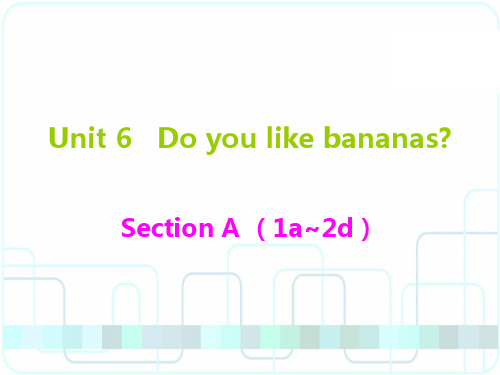人教版英语七年级上册Unit6SectionA课件
Unit 6 Section A(2a-2d)七年级上册英语课件(人教版)

burger/ˈbɜː(r)ɡə/汉堡包
Their friend, John’s birthday is coming.They want to think about思考,考虑 the food.
Jack, Tom and Bill
Listen to 2d and answer the questions. 1. When什么时候 is John’s birthday dinner?
hamburgers tomatoes French fries oranges bananas tea strawberries bread apples carrots pears broccoli meat water milk eggs ice cream salad chicken vegetables
6
orange
9
salad
Game: What’s missing?
Can you remember them all?
Game: What’s missing?
Game: What’s missing?
Do you like apples? Do you like salad?
Yes, I do. I like apples.
2a Listen and circle the
food you hear. hamburgers pears tomatoes strawberries
人教版初中英语七年级上册Unit 6 Section A (1a-2d)-课件

A: Do you like salad? B: No, I don’t.
A: Do you like oranges? B: Yes, I.
2b Listen again. Fill in the blanks.
2c (Imagine you are having lunch with your friend.) Practice the conversations in 2b. Give answers
that are true for you.
2d Answer the questions below and then role-play the conversation.
Do you like bananas? 1 Yes, I do.
3
Do you like oranges? Yes, I do.
Practice
1c Practice the conversations above with your
partner. Then make you own conversations.
A: I like _h_a_m__b_u_r_g_e_rs__. Do you like _h_a_m_b_u_r_g_e_r_s____? B: Yes, I do. A: Do you like_t_o_m_a_t_o_e_s ? B: No, I don’t like___to_m__a_t_o_e_s___. A: Let’s have _ic_e_-_cr_e_a_m_. B: Oh, no. A: No? B: I don’t like _ic_e_-_cr_e_a_m___.
七年级英语上册 Unit6 Do you like bananas Section A 2课件 人教新目标版

3. I like bananas. 我喜欢香蕉。 (1) like表示“喜欢”, 是动词。如果主语 是 第三人称单数, 后要加“s”。例如: He likes apples. 他喜欢苹果。 (2) 否定形式要在like前加don’t或在likes 前加doesn’t, 同时把likes改为like。 I don’t like bananas. 我不喜欢香蕉。 He doesn’t like apples. 他不喜欢苹果。
IV. Exercise
一. 按要求写出下列单词 1. watch(复数)________ watches 2. carrot(复数)________ carrots 3. sound(第三人称单数)_______ sounds 4. tomato(复数)________ tomatoes 5. I(宾格)____ me 6. it is(缩写)_____ it's
2. Do you like oranges? orange n. 既可以是可数名词, 也可以 做不可数名词。当可数名词时, 意思是 “橘子”;当不可数名词时,意思是橘汁。 如:Can I have an orange juice, please? 我可以要一杯橘汁吗? I like oranges better than tomatoes. 与西红柿比,我比较喜欢橘子。
二.词汇 1. We have __________ (蔬菜)for dinner vegetables every day. 2. We have _____ (许多)clubs. Join us soon. many 3. Edle doesn't like ________ (西红杮). tomatoes 4. —Let's eat ice cream. —That sounds (听起来)good. ______ 5. I like ____________(草莓)very much. strawberries
Unit6SectionA1a-1c课件人教版七年级英语上册

二、 根据图片提示完成句子。 1. — _D_o_ you like _st_r_a_w_b_e_r_r_i_e_s
— Yes, I do. I like _b_a_n_a_n_a_s_, too. 2. — _D_o_e_s_ your father like _p_e_a_r_s_
Do you like .... B: Yes, ..... \ No, ..... I like .... A、B、C: OK, let's have ....
grapes
mangoes
一、 选词填空。
Do you like ___ (strawberry/strawbe√rries) 2. Here are some ___ (tomatos/toma√toes). 3. Let’s ___ (h√ave / has) apples and bananas. 4. John likes ___ (m√ilk/milks) and bread. 5. Sam ____ (don’t /√doesn’t) like vegetable
9. milk e 10. bread a
1b Listen and number the
conversations [1-3].
2 A: Do you like salad
B: No, I don’t.
1 A: Do you like bananas
B: Yes, I do.
3 A: Do you like oranges
tomatoes oranges strawberries eggs
carrots
pears
hamburgers
eggs oranges apples bananas pears milk food ice-cream salad bread strawberries rice chicken carrots tomatoes
人教版初中初一七年级英语上册 名师教学课件 Unit 6 Do you like bananas (

John likes strawberries and apples.
Complete the sentences. 1.你喜欢沙拉吗? 是的,我喜欢。
__D_o__you __l_ik__e__salad? Yes, I __d_o____ .
Bob Gina
Reading time
Read the conversation in 2d. Then answer the questions.
1. Does John like hamburgers?
Yes, he does.
2. What does Jack don’t like?
Jack doesn’t like salad.
3. He (like / likes) bananas, but he (don’t / doesn’t) like oranges.
4. We (likes / like) hamburgers, but we (don’t / doesn’t) like chicken.
5. They (likes / like) pears, but they (don’t / doesn’t) like strawberries.
Thank You
新疆伊犁新源县扬新中学 李绍君
人教版 英语 七年级上册
Section A (2d-3c) Grammar & practicing
新疆伊犁新源县扬新中学 李绍君
Learning goals 1. 了解可数名词与不可数名词、单数名词与复数名词
2. 学会用like谈论喜好 •3. 学会使用一般疑问句及其回答 •Do you like strawberries? •Yes, I do/No, I don't. •Does he like pears? •Yes, he does/No, he doesn't. •He likes… He doesn’t like…
【学海风暴】2016人教版七年级英语上册(课件)Unit6SectionA(1a-2c)

请注意:可数名词 有单数和复数两种 形式
pears
hamburgers
— —
请注意:不可数名词 What’s that? 要用原形,没有复数形式。 It’s _____. milk salad, ice-cream 既是可数名 词又是不可数名词。
bread
salad
(an) ice-cream
strawberries
bananas
2b
Listen again. Fill in the blanks.
ice-cream
tomatoes
ice-cream
tomatoes
b
Practice the conversations above. Give answers that are true for you. Yes, I do.
Unit 6
Do you like bananas?
Section A(1a-2c)
Presentation
— What are these? — They are oranges.
tomatoes
bananas
— What are these? — They are ….
strawberries
Fruit:
tomatoes
oranges
strawberries Food:
pears
bananas
bread
hamburgers salad
Grammar
可数名词
(1)定义:是可以计数的名词。 (2)可数名词前可以用 a , an 限定,表一 个。 (3)可数名词前可以用 one, two , three… 限定。 (4)可数名词有复数形式。
七年级英语上册 Unit 6 Do you like bananas(第1课时)Section A(1a-2d)课件 (新版)人教新目标版

some意为“一些”。用于修饰可数名词复数以 及不可数名词。 一般用于肯定句中。
She has some nice skirts.她有一些好看的裙子。
(1)通常情况下, 在否定句和疑问句中, 要将some改为any 。
Do you have any milk?你有牛奶吗?
后面可以接very much, a lot, a little, not…at all 等表程度的词。
Jerry likes Chinese food very much. 杰里非常喜欢中国的食物。
like还可作介词,意为“像”。 一般位于be动词或其他动词之后 。like后接名词或代词作宾语。
The girl looks like her father. 这女孩长得像她爸爸。
bananas
2b Listen again. Fill in the blanks.
hamburgers
tomatoes
ice-cream ice-cream
tomatoes
2c Practice the conversations above. Give answers
that are true for you.
1.Do you like bananas?你喜欢香蕉吗?
询问某人的喜好,常用句型:Do/Does+主语+ like+…? 意思是“某人喜欢……吗?”
肯定回答用:Yes,主语+ do/does; 否定回答用:No,主语+don’t/doesn’t.
like是及物动词,意为“喜欢”。 like +sb. /sth. /doing sth. /to do sth. 意为“喜欢某人/某物/做某事”。
Unit 6 Section A Grammar Focus-3c 课件 人教版英语七年级上册

Grammar Focus
Do you like salad?
Do they like pears? Does she like tomatoes? I like oranges. We like rice. He likes ice-cream.
Yes, I do./No, I don't.
Yes, they do./No, they don't. Yes, she does./No, she doesn't. I don't like bananas. We don't like hamburgers. He doesn't like vegetables.
Complete the chart!
Food
Likes Doesn’t like
Ⅰ. 用所给单词的适当形式填空。
1. I like __t_o_m__a_to_e_s___(tomato) very much. 2. Nick ____l_ik_e_s_____(like) hamburgers and salad. 3. Let’s ___t_h_i_n_k_____(think) about the birthday dinner. 4. Ms. Smith has ten _s_t_r_a_w_b_e_r_r_ie_s_(strawberry)? 5. Hamburgers? That ___s_o_u_n_d_s____(sound) good. 6. My brother __d_o_e_s_n_’t_l_i_k_e_(not like) eggs. 7. His cousins ___d_o_n_’t__li_k_e__(not like) ice-cream.
新人教版英语七年级上册 Unit 6 第二课时 Section A 2a-2e

询问时间(what time与when)
➢ 对时间的提问一般用when和what time。 ◆具体用法 1.when是疑问副词,意为“什么时候,何时”,用于对日期(某年、某月、某日)提问。 eg:When are you going to leave Shanghai?你们打算何时离开上海?
When were you born?你何时出生的? 2.当询问某年某月某日的上午、下午、晚上等某个具体时刻钟点时,用what time。当 泛指“做某事的时间”时,when和what time一般可互换。
3.when还表示“当……的时候”,而what time无此意思。 eg:I was reading a book when my mother got home.
妈妈到家时我在读书。 4.what time用来对某个时间提问,希望知道的时间比
when更具体。 eg:—What time do you get up in the morning? 你早上几点起床? —About six.大约6点。 What time does the shop open?这个商店几点开门?
• 1)询问做某事的具体时间(钟点)时,可用___w___h_a_t__t_i_m或e
_____w_h__e_n__提问。
• 2)询问事件(月份、星期、日期)等非钟点时间时只能用_______。
• 3w)h询en问钟表所表示的具体时间(钟点)时,只能用__w__h__a_t__t_i_m。e
填空:
1) --___W__h_a_t__ti_m__e__ do you eat breakfast?
2c Read again and complete Tom’s school day routine.
Unit 6 第1课时 (Section A 1a-2d) 教学课件-七年级英语上册(人教新目标)

like后接可数名词, 常使用复数形式; 接不可数名词,用 原形。
Let’s talk Ask your partner about his/her eating habits.
Do you like ...?
Yes, I do. I like ...
/peə(r)/
/peə(r)z/
➢ pear -a pear -two pears
➢ orange -an orange -two oranges
/bəˈnɑːnə/
➢ banana -a banana -three bananas /bəˈnɑːnəz/
Let’s learn Let’s learn and talk.
They are/It is … (healthy/
sweet/ juicy/... )
No, I don’t.
I don’t like ... They are/It
is … (unhealthy/...)
开始
Let’s predict Liu Li and John meet their friends in the dining hall.
/ˈsæləd/
➢ salad -a salad-two salads /ˈsælədz/
Let’s learn Let’s learn and talk.
/ˈtʃɪkɪn/
➢ chicken-a chicken-chickens/ˈtʃɪkɪnz/
/mɪlk/
➢ milk -milk -milk
Jack: Hey, John’s birthday dinner is next week. 下周。 该短语前不加介词。
Unit6SectionA1a--1c课件人教版七年级英语上册

1a Match the words with the things in the picture.
ad e g i
h
c b
f j
1. hamburgers _d__
2. tomatoes _i__
3. oranges _f__ 4. ice-cream _h__ 5. salad _b__ 6. bananas _g__ 7. strawberries _c__ 8. pears _j__
or __p_e_a_rs___.
Different people like different food. How about your
family? Please write to me soon. Yours, Tony
Speak and write
Report(报告): Hello, everyone! As you know, different people like different food. In our group, I like...and...,but I don't like... ____likes…and…, but ___doesn’t like… ___likes …and … but ____ doesn’t like… ___likes …and … but ____ doesn’t like…
Unit 6 Do you like bananas?
SectionA(1a-1c)
Learning objectives
To learn to talk about likes and dislikes To learn new words about food: apple, banana, hamburger, tomato, potato, icecream, salad, strawberry, pear, milk, bread, food, sure, vegetable, fruit
人教版七年级上册英语Unit 6 课时1 Section A (1a-2d)

四、根据汉语意思完成句子。 16. 我们学校的篮球比赛在下周。 Ourschoolbasketballgameis______________.
nextweek
17. 这个黑色的帽子怎么样? ________________thisblackhat?
Whatabout
18. 今天晚上我在家里举行生日宴。 ThiseveningIhavemy________________athome.
A. Oh, do you like vegetables?
B. What are these in English?
C. You’re welcome. D. Sure. I have an
apple a day. E. What about milk?
A. Oh, do you like vegetables?
B. What are these in English?
C. You’re welcome. D. Sure. I have an
apple a day. E. What about milk?
A. Oh, Edoyoulikevegetables? B. WhataretheseinEnglish? C. You’rewelcome. D. Sure. Ihaveanappleaday. E. WhCataboutmilk?
五、按要求完成句子。 21. YiMinglikesoranges. (改为一般疑问句) _______YiMing_______oranges?
Doeslike
22. YiQianlikesice-cream. (改为否定句) YiQian______________ice-cream.
人教版七年级英语上册教学课件:Unit 6 Do you like bananas(共90张PPT)

课堂练习
三、根据汉语意思完成句子,每空一词 1. 你喜欢草莓吗? Do you ___li_k_e__ ___s_tr_a_w_b__e_rr_ie_s___? 2. ——你喜欢苹果吗? ——不,我喜欢梨。 —Do you __li_k_e__ __a_p_p_le_s_? —No, I __d_o__n_'t__. I __li_k_e__ __p_e_a_r_s__.
Unit 6 Do you like bananas?
Section A (1a~2d)
课前导学
核心单词 1. ___b_a_n_a_n_a____ n. 香蕉 2. ____h_a_m_b_u_r_g_e_r____ n. 汉堡包 3. ____t_o_m_a_t_o____ n. 西红柿 4. ___i_c_e_-c_r_e_a_m____ n. 冰激凌 5. ____s_a_l_a_d___ n. 沙拉 6. __s_t_r_a_w_b_e_r_ry____ n. 草莓 7. ____p_e_a_r____ n. 梨 8. ____m_i_lk______ n. 牛奶
要点梳理
2. sure的用法 【教材例句】—Let's think about the food. 让我们来 想想(吃什么)食物吧。 —Sure. 当然。 (教材第32页) 【要点思维导图】
要点梳理
【举例】 —Can you help me? 你能帮我吗? —Sure. 当然可以。 I am sure he can come to my birthday party. 我确信 他会来参加我的生日聚会。
要点梳理
2 句型“How about …?”的用法 【教材例句】How about burgers, vegetable salad, and some fruit? 汉堡包、蔬菜沙拉和一些水果怎么样? (教材第32页) 【用法】“How about …?”意为“(提出建议)…… 怎么样?”,用于提出建议或请求,相当于“What about …?”,其中about为介词,后接名词、代词或 动词-ing形式。
Unit 6 Section A(Grammar Focus)课件人教版2024新教材七年级上册英语

3c Complete the passage with the correct forms of the verbs in
brackets.
correct form 正确形式
gets does
makes
meets
play
goes
helps
watches
plays
goes
restaurant n. 饭店
妈妈到家时我在读书。 4.what time用来对某个时间提问,希望知道的时间比
when更具体。 eg:—What time do you get up in the morning? 你早上几点起床? —About six.大约6点。 What time does the shop open?这个商店几点开门?
8. 这是我的学校日程安排。T_h_i_s_i_s _m_y__sc_h_o_o_l_d_a_y_r_o_u_ti_n_e_.
9. 你什么时候吃早餐?__W__h_e_n__d_o_y_o_u__h_a_v_e_b_reakfast?
10. 早睡早起。 _E_a_r_ly__to__b_e_d_,_e_ra_l_y_t_o_b_e_d_._
When/ What time区别: 表什么时候,具体时间(钟点) 两者都可用。
年份,月份,日期等非钟点性时间只能用 when不能用 what time
When具体时间、 年、月、日非钟 点性时间
What time 具体时间钟点
What的使用方式
➢ what 对动词进行提问 ➢ The woman is cooking in the kitchen. 这个女人正在厨房里做饭。 ➢ 对划线部分句子提问: ➢ What is the woman doing in the kitchen? (此处是对动词提问,注意做变换时时态是
人教版七年级英语上册《Unit 6 Section A 2a-2d》课堂教学课件PPT初中公开课

Unit 6Section A 2a-2d人教版 英语 七年级上册ØLanguage Goalsu To learn new words and keysentence patterns.u To talk about the food on John’sbirthday.ØEmotional Goalu To know the food your friends likeand the food they don't like.Do you like …?Yes, I do. /No, I don’t.ØPair workDo you like …?Yes, I do.No, I don’t.A:Do you like hamburger s?B: Yes, I do. / No, I don’t.A: Do you like salad?B: Yes, I do. / No, I don’t.I don’t likeI likehamburgers pears tomatoesstrawberries oranges ice creamsalad bananas Listen and circle the food youhear.2aListen again. Fill in the blanks.tomatoestomatoes ice cream ice cream2bPractice the conversations above. 2cGive answers that sre true for you.I like hamburgers.Yes, I do.Do you like hamburgers?Let’s havetomatoes.Oh, no. I don’tlike tomatoes.What aboutan ice-cream?Sounds good.Talk about your favorite fruit with your partner.Role-play the conversation.Jack: Hey, John’s birthday dinner is next week.Let’s think about the food. Tom: Sure. How about burgers,vegetable salad, and some fruit? Bill: Sounds good. John likeshamburgers.2dJack: Oh, I don’t like salad.Bill: But John likes salad, and it’s his birthday. Jack: Yes, you’re right. What about the fruit? Tom: I think John likes strawberries andapples.Bill: OK. Let’s have strawberries and apples then.Complete the conversation.I like __________. Do you like _____?Yes, I ____. _____ Sally _________?No, she doesn't.Let's ________________.That _______ good.ice-cream sounds have an ice-creamdo it Doeslike it1. John’s birthday dinner is next week.“next week” 译为“下周”,英语中的“next”, “last” 后跟表示时间的词语构成时间状语,如: next day第二天last month上个月next month下个月last week上周next year明年last year去年2. Let’s think about the food.让我们来想想(吃什么)食物吧。
人教版七年级英语上册Unit6 A Day in the Life SectionA课件

自我评估量表
Poor
Rates(等级) Keep trying Not bad
Good
Excellent
要点1:o more reading before class 在课前阅读 do some reading是一种表达,泛指各种阅读活动;用于描述某人正在阅 读,或者用于建议某人阅读。 有类似表达的动词还有cleaning、washing、shopping、cooking等。 辨析:do some reading和read do some reading涵盖广泛,强调持续的阅读活动或建议。 read为动词,强调阅读的瞬间动作或内容。 当建议某人多读书时,应用do more / some reading,而不是read more books。
( C )1.Li Na is a middle school student.She always says“I will do my homework tomorrow.”But tomorrow never comes.
you’re willing to squeeze (挤) it. B.If you don’t work hard when you’re young,you’ll only regret (后悔) it when you’re old.
always usually
频率副词 总是
通常
频率百分比 100% 80%
often sometimes seldom
经常
有时
很少
60%
50%
30%
hardly ever 几乎不
10%
never 从不
0
迁移应用:
4.现在几点了?
What
time is it now?
人教版英语七年级上册Unit6SectionAGF-3C23张PPT

精编优质课PPT人教版英语七年级上册 Unit 6 Section A GF-3C 23张PPT(获奖课件推荐下载)
精编优质课PPT人教版英语七年级上册 Unit 6 Section A GF-3C 23张PPT(获奖课件推荐下载)
不可数名词 1.定义:是指不能计数的名词。 2.不可数名词前不可以用a , an限定。 3.不可数名词前不可以用one, two, three…
精编优质课PPT人教版英语七年级上册 Unit 6 Section A GF-3C 23张PPT(获奖课件推荐下载)
3a Underline the correct words in the brackets.
以-s, -x, -sh,
1.I like fruit, but I (don't/doesn't) like 精编优质课PPT人教版英语七年级上册Unit 6 Section A GF-3C 23张PPT(获奖课件推荐下载)
精编优质课PPT人教版英语七年级上册 Unit 6 Section A GF-3C 23张PPT(获奖课件推荐下载)
2.不可数名词前不可以用a , an限定。 精编优质课PPT人教版英语七年级上册Unit 6 Section A GF-3C 23张PPT(获奖课件推荐下载) 口So, let's get salad.
精编优质课PPT人教版英语七年级上册 Unit 6 Section A GF-3C 23张PPT(获奖课件推荐下载)
A: Does he have a spoecnc?er ball? B: Yes, he does. No, he doesn’t.
精编优质课PPT人教版英语七年级上册 Unit 6 Section A GF-3C 23张PPT(获奖课件推荐下载)
- 1、下载文档前请自行甄别文档内容的完整性,平台不提供额外的编辑、内容补充、找答案等附加服务。
- 2、"仅部分预览"的文档,不可在线预览部分如存在完整性等问题,可反馈申请退款(可完整预览的文档不适用该条件!)。
- 3、如文档侵犯您的权益,请联系客服反馈,我们会尽快为您处理(人工客服工作时间:9:00-18:30)。
banana — bananas
orange — oranges
strawberry — strawberries
tomato — tomatoes
请注 意:
不可数名词 (uncountable noun)
milk, bread
ice cream
salad
不可数名词没有复数形式。 salad, ice-cream也可以作复数
John likes strawberries and apples.
Role-play the conversation.
Make a similar conversation.
Let’s have tomatoes?
Oh, no. I don’t like tomatoes.
What about an ice-cream?
tomatoes
ice-cream ice-cream
tomatoes
Practice the conversations above. Give answers that are true for you.
I like hamburgers. Do you like hamburgers?
Oh,no, I don't like hamburgers. I like icecream.
3. — Let’s h__a_v_e_ salad. — Oh, no. I _d_o_n__’t_ ___li_k_e_ salad.
4. — Let’s h__a_v_e_ _i_c_e_-_c_r_e_a_mand _h_a_m__b_u__r_g_e_r.s — That _so__u_n_d_s_ good. I _l_ik_e_ them.
用所给词的适当形式填空。
1.Do they __li_k_e_ (like) hamburgers? 2.Let’s _h_a_v__e__ (have) some milk. 3.We_d_o_n_’__t__li_k_e( not like) bread. 4. _S_a_m__’__s(Sam) birthday is next week. 5.It sounds ______g_o_o(dwell). 6.He likes t_o_m__a_t_o_e_s__ (tomato).
What’s in the fridge?
Let's see.
banana
What’s in the fridge?
apple
apples
What’s in the fridge?
hamburger
hamburgers
ice cream
salad
salad
milk milk
bread
bread
Ⅱ. 根据图片提示完成句子。
1. — _D__o__ you likest_r_a_w__b_e_r_r_i_e_s_? — Yes, I do. I likeb_a_n_a_n__a_s_, too.
2. —D__o_e_s_ your father like _p_e_a_r_s_? — No. Shedo__e_sn__’_t _ like _p_e_a_r_s_.
— They're _____.
— What’s this? — It’s a/an _____.
orange
oranges — What are these?
— They're _____.
A: Do you like apples?
B: Yes, I do. I like fruit.
水果
A: Do you like oranges?
— Sure. 当然啦。
5、dinner n. (中午或晚上吃的)正餐 常用来表示一天中的正餐(main meal),既可指晚餐,也可 指午餐。英语国家的晚餐一般是一天中最丰盛的一餐,因此, dinner常用来指晚餐。此外,dinner一词比较正式,邀请朋友 赴宴时常用。口语中常用supper。
It’s time for dinner. 该吃晚饭了。
5、food n. 食物,食品 当表示食物的总称时,用作不可数名词, 在句中作主语时,谓语动词用第三人称单数形式。
I’m hungry. I need some food. 我饿了,我需要一些食物。 Some food is on the table.一些食物在桌子上。
注意:当表示特定种类的食物时,food用作可数名词,其复数形式为foods。 Rice and chicken are good foods. 米饭和鸡肉是很好的食物。
Read the dialogue in 2d. Then answers the questions.
Does John like hamburgers? Yes, he does. What does Jack don’t like? Jack doesn’t like salad. What fruit does John like?
用哦! 既是可数名词又是不
可数名词。
(1) three ice creams 三个冰淇淋 ice cream 冰淇淋(指成份)
(2) two salads 两碟沙拉 salad 沙拉(指成份)
你还知道哪些既可做单数也 可作复数的食品吗?
Match the words with the things in the
pears
bananas
strawberries hamburgers
fruit:
strawberries
pears bananas oranges
vegetables: carrots
tomatoes
salad
A: Do you like bread? B: No, I don’t.
A: Do you like ice-cream? B: Yes, I do.
点拨:
名词按照其所表示是事物的性质可以分为可数名词 和不可数名词两类。 可数名词有单复数形式。 不可数名词一般没有复数形式。
请注 意:
可数名词有单数和 复数两种形式
可数名词 复数的变化 (countable noun)
apple
Байду номын сангаас
— apples
pear
— pears
hamburger — hamburgers
__e__
10. bread
_a___
Listen and number the conversations.
2
A: Do you like salad? B: No, I don’t.
1
A: Do you like bananas? B: Yes, I do.
3
A: Do you like oranges? B: Yes, I do.
picture.
1. hamburgers
d __i __
2. tomatoes __f__
3. oranges 4. ice-cream 5. salad 6. bananas
__h__ ______bg______
7. strawberries __c__
8. pears
__j__
9. milk
Unit6 Do you like bananas? Section A (1a~2d)
学习目标
1 掌握单词:banana, hamburger, tomato, ice-cream, salad, strawberry, pear, milk, bread, birthday, dinner, week, food, sure, vegetable, fruit, right, apple, then。
3、Let’s have … 是一个祈使句, 表示“让我们吃/喝……吧。” Let’s have some oranges. 我们吃些苹果吧。
4、sure adv. (用作副词)当然;肯定;一定 常用来回答一般疑问句,意为“当然;的 确”, 相当于yes或certainly。
— Are you going with us? 你和我们一起去吗?
B: No, I don't. But I like
vegetables. 蔬菜
— What’s that? — It’s _____.
milk
bread
salad
an ice-cream
— What are those? — They are _________.
tomatoes
oranges
2 掌握句型: — Do you like …? —Yes , I do./No, I don’t. I like…,but I don’t like….
3 能够听懂并讨论喜欢与不喜欢的食物。
— What’s this? — It’s a/an _____.
schoolbag
schoolbags — What are these?
Practice the conversations above with your partner. Then make your own conversations.
bananas oranges strawberries
hamburgers ice-cream
A: Do you like ...? B: Yes, I do. / No, I don’t. A: Do you like ...? B: Yes, I do. / No, I don’t. A: Let’s have ... B: That sounds ...
Sounds good.
